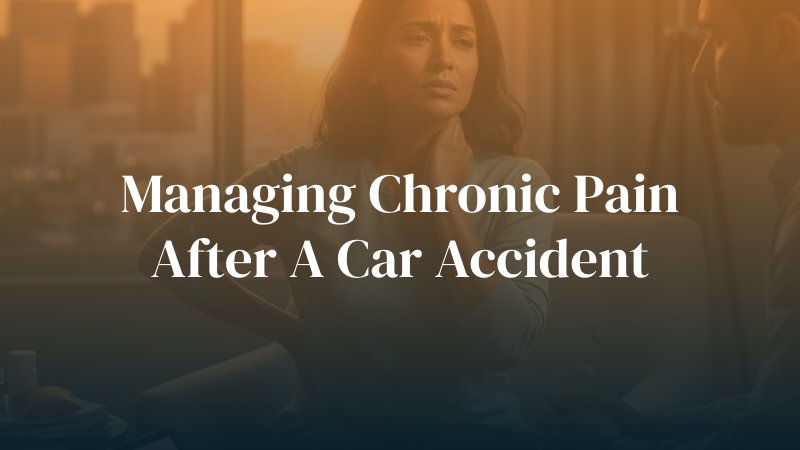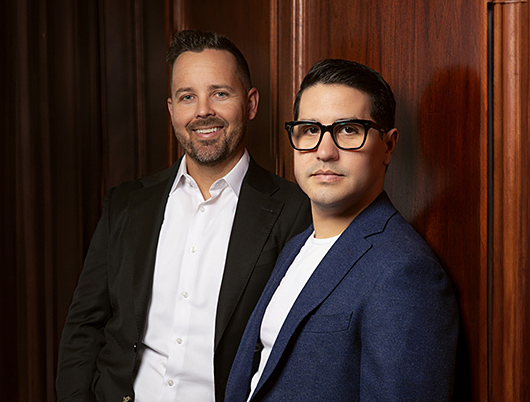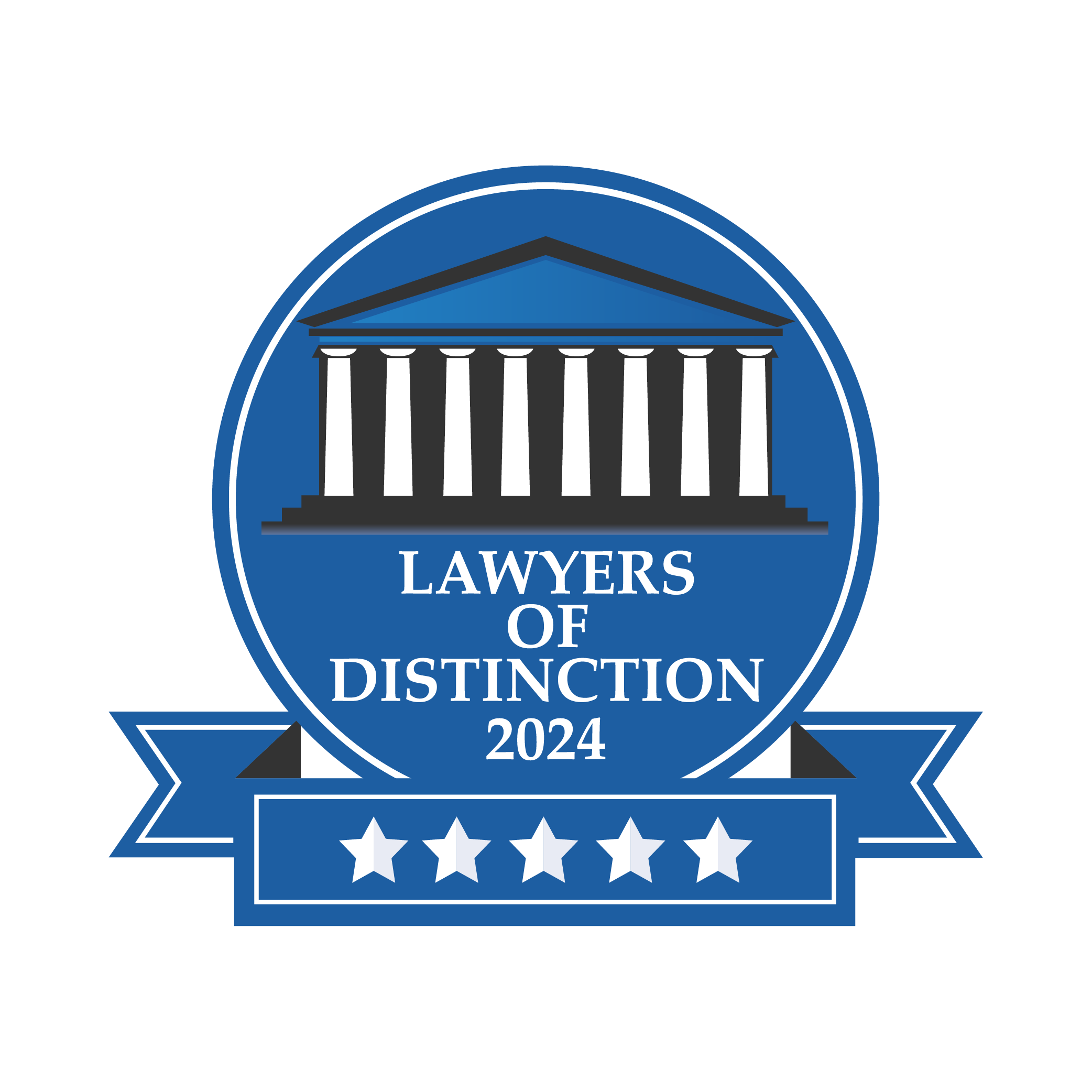Managing chronic pain after a Las Vegas car accident can take over your life. What starts as soreness can turn into months or years of ongoing discomfort that makes work, sleep, and daily routines difficult. When that pain is caused by someone else’s negligence, a Las Vegas personal injury lawyer can help you pursue compensation for your medical bills, lost income, and long-term suffering.
Understanding how chronic pain works is key to protecting your legal rights.

What Counts as “Chronic” Pain After a Crash?
After a car accident, doctors generally call pain “chronic” if it doesn’t get better in three months or if it continues far past the expected healing time for typical injuries. Common types of chronic pain you could experience after a car accident include:
- Musculoskeletal Pain: Ongoing pain in the neck, back, shoulders, or joints is common after a crash.
- Nerve Pain: Nerve pain can be long-lasting, and generally includes burning, tingling, sharp shocks, or numbness in specific areas.
- Headaches and Migraines: Many car crash victims develop persistent headaches or even become prone to frequent migraines.
- Complex Regional Pain Syndrome (CRPS): CRPS is a condition that can happen after an injury or trauma, where pain becomes much worse than it should for the actual injury you suffered. It can lead to severe and long-term pain.
Chronic pain affects physical, emotional, and financial well-being — one of the main reasons car accident victims seek help from an experienced Las Vegas car accident lawyer early.
Evidence of Chronic Pain Used in Car Accident Cases
Saying you’re in pain after a car accident isn’t enough to win a legal claim – you’ll need to document your symptoms so insurers or a jury understand just how much your life has changed. There are several powerful ways to show your pain is real and ongoing. Evidence may include:
Medical Records and Doctor’s Notes
Healthcare providers keep careful records each time you see them, and their notes may point to ongoing issues. Regular visits for the same problems help prove your pain isn’t just temporary.
Imaging and Test Results
Tests like MRIs, CT scans, or X-rays may spot injuries such as herniated discs, nerve pinching, or joint damage, all of which can explain why your pain continues.
Reports from Physical Therapists and Pain Specialists
Doctors and therapists who see you repeatedly will notice slow progress, setbacks, or new complications. Their detailed notes and professional opinions explain how your chronic pain continues to show up and affect your life.
Prescription History
A track record of picking up prescription medication shows an ongoing need for pain relief. This can be used to show how long your symptoms have been going on for.
Testimony from Family and Friends
People who spend time with you are typically the ones who notice changes in you the most. Friends and family members can testify about how you’ve changed since the accident, like explaining that you can no longer participate in certain activities and hobbies because of your pain. The more evidence you have backing up your chronic pain, the more likely you are to get the compensation you deserve.
Steps You Should Take After an Accident to Deal With Chronic Pain
If you’re dealing with chronic pain after a car accident, you should consider taking the following steps:
Seek Professional Medical Evaluation
It’s important to consult with a doctor as soon as possible after your accident to assess your injuries. A thorough medical evaluation helps uncover the root causes of your pain and come up with a treatment plan.
Physical Therapy
Physical therapy is often a core part of chronic pain recovery for accident survivors. Therapists use targeted exercises and movements to restore joint and muscle function, improve flexibility, and prevent stiffness. Customized rehabilitation can strengthen weak areas and help take some of your pain away.
Medication
Medications such as Tylenol, Advil, Motrin, or Aleve may offer relief from mild to moderate pain in the short term. If these are not enough, your physician may prescribe other medications targeting nerve pain or inflammation. Always talk with your healthcare provider about the risks, benefits, and proper use of any medication, as each medicine has potential side effects and interactions.
Chiropractic Care
Chiropractors use manual adjustments to improve alignment and movement in your spine after an accident. These treatments can help alleviate pain by addressing subtle joint imbalances or vertebral misalignments. Techniques like spinal decompression and therapeutic massage are sometimes incorporated and, for many patients, can support recovery alongside conventional therapies.
Other Treatment Options
A variety of additional therapies can ease pain following accidents. Massage therapy soothes tense muscles and supports relaxation, while heat or cold packs can help minimize acute pain and swelling. For persistent or severe pain, interventional pain management, including injections or nerve blocks, may directly target troubled areas. Severe cases could need spinal cord stimulation or surgery.
Lifestyle Modifications
Adjusting your daily habits can promote healing and ongoing comfort. Rest ensures your body has time to repair, while low-impact activities like walking or swimming improve circulation and flexibility. Stress management, such as mindfulness or relaxation exercises, keeps anxiety from making pain worse. Eating a nutritious diet gives your muscles and tissues the building blocks they need for recovery.
Importance of Early Intervention
Acting quickly after your pain starts can make a big difference in how well and how fast you recover. Early evaluation stops minor injuries from turning into longer-term issues. Quick action could spare you months or even years of avoidable discomfort.
Damages You Can Claim in a Chronic Pain Case
Part of managing chronic pain after a car accident is seeking damages for your injuries so you can better focus on your recovery. Compensation can help cover long-term needs that many victims face. Some common types of damages include:
Medical Bills – Past and Future
Victims of car accidents can recover money to cover hospital stays, follow-up doctors visits, prescription drugs, injections like nerve blocks, therapy sessions, and even walk aids or braces. This includes both bills you’ve already received and the expected future expenses related to your medical care.
Lost Wages and Loss of Earning Capacity
If your pain makes it impossible to work, you can recover the lost wages you aren’t able to earn as a result. You can also recover compensation for reduced earning capacity. If you’re no longer able to work the same job in the future or work as many hours and earn as much money, you can recover the difference between what you can make now and what you used to make.
Pain and Suffering
You are entitled to money for the physical pain and suffering you experience from the injury. This is really important in chronic pain cases, as the impact of long-term pain can be significant.
Loss of Enjoyment of Life
Chronic pain not only hurts physically; it also affects your mood and the activities you’re able to participate in on a day-to-day basis. If your pain stops you from doing things you love, like traveling, playing with kids, or socializing, you can recover financial compensation for these losses.
Punitive Damages
In rare cases, courts may award punitive damages if there is clear and convincing evidence that the other party acted with oppression, fraud, or malice. These damages are meant to punish especially bad behavior, not just compensate you.
NRS 42.005 Exemplary and punitive damages: In general; limitations on amount of award; determination in subsequent proceeding. 1. Except as otherwise provided in NRS 42.007, in an action for the breach of an obligation not arising from contract, where it is proven by clear and convincing evidence that the defendant has been guilty of oppression, fraud or malice, express or implied, the plaintiff, in addition to the compensatory damages, may recover damages for the sake of example and by way of punishing the defendant.
They serve as a warning to others and are not awarded in most standard car accident cases. Protecting your right to fair compensation makes it easier to cope with the expensive and lasting reality of chronic pain, giving you and your family more security and peace of mind as you recover.

No feesNo pressure
You Don’t Pay Unless We Win Your Case
Our Las Vegas personal injury lawyers work on a contingency fee — that means you owe nothing unless we win.
Contact Valiente Mott Injury Attorneys Today
If you’ve been involved in a car accident because someone else was negligent and you’re suffering from chronic pain, you don’t have to face this on your own. Our team is here to help you fight for the compensation you’re entitled to so you can get your life back on track. Reach out today to schedule a free consultation with a Las Vegas car accident lawyer from our firm.

